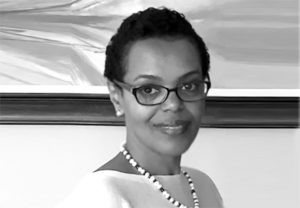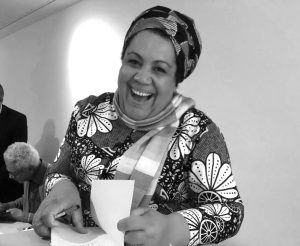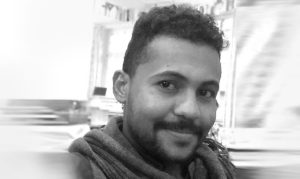The Africa Institute is pleased to announce the recipients of the Global Africa Translation Fellowship 2023 – 2024. Grants in the range of $1,000 to $5,000 are offered annually to support the completion of translations of original works from the African continent and its diaspora, into Arabic and/or English. Selected works may be retranslations of old, classic texts, or previously untranslated works, collections of poetry, novel, prose, or critical theory. The project may be a work-in-progress, or a new project feasible for completion within the timeframe of the grant.
The awardees for the 2023 Global Africa Translation Fellowship are:
Bethlehem Attfield, for the translation of Ethiopian writer Adam Reta’s selected Amharic short stories into English. This project hopes be made available as a resource to global-South literary practitioners to carry out a comparative literature analysis using Reta’s Histinawinet theory. Histinawinet theory can transform the way African literature addresses important research questions.
Ida Hadjivayanis, for the translation of Kasri ya Mwinyi Fuad (1978) novel from Swahili to English using the foreignising strategy where an international audience will get a glimpse into one perspective of life in Zanzibar before the revolution.
Mohamed Bashir will produce an Arabic translation of one of the most important written sources of the Middle Nile region during the Medieval time carried by British archaeologist O. G. S. Crawford during the British Academy Expedition in 1951-1952 that explored the ancient sites on both banks of the Nile between Atbara and Abu Hamed.

Bethlehem Attfield is currently an Amharic literary translator and is a Ph.D. candidate researching Translating African Literature at the University of Birmingham. She holds a Masters degree in Gender, Culture, and Society from Birkbeck University, London. Bethlehem has pursued diverse professional interests across civil society support, gender, and human rights advocacy with different institutions such as the UN, and NGOs, as well as running private business enterprises in Asia and Africa. Her first novel translation, The Lost Spell is published by Henningham Family Press (UK) and is shortlisted for the 2022 TA First Translation Prize by Society of Authors. She hosts a YouTube podcast Journey to Ethiopia with Story to promote the translation of Amharic literature.

Ida Hadjivayanis is currently Senior Lecturer in Swahili Studies at School of Oriental and African Studies (SOAS), University of London where she convenes main Africa-focused programmes: MA African Studies and BA Africa and Black Diaspora. She is also a Fellow of the Higher Education in the United Kingdom. Ida holds a Ph.D. in Swahili Translation from SOAS. Her research interest lies at the intersection of Translation, African Studies, Swahili studies and Trans-oceanic encounters on the Indian ocean in East Africa. She has recently translated Tanzanian-born British novelist and academic Abdulrazak Gurnah’s ‘Paradise’ into Swahili – Peponi published by Mkuki na Nyota.

Mohamed Bashir is an Assistant Professor of Archeology at the Department of Archaeology, University of Khartoum. He received his B.A. (2011), M.A. (2015), and Ph.D. (2018) from the University of Khartoum. His PhD. dissertation was entitled “Meroitic Urban Centers: a comparative archeological study between Kedurma and Hamadab“. He has completed his dissertation under a DAAD-region scholarship and completed a six-month research stay at the Institute of Egyptology and Coptology, University of Münster, Germany. He has extensive field research experience including serving as Field Director for the Meroe Northern Environs Archeological Project, the Mahas Survey Project ‘The Historical Town of Nauri’, and excavations at Kedurma. He has presented this work at numerous international conferences. Currently, he is also a NGS Explorer for the project entitled “A Paleo-genomic Study of the Meroitic Peoples of Kedurma (350 BCE-350 CE) in Sudanese Nubia“.
The Africa Institute is pleased to announce the recipients of the Global Africa Translation Fellowship 2023 – 2024. Grants in the range of $1,000 to $5,000 are offered annually to support the completion of translations of original works from the African continent and its diaspora, into Arabic and/or English. Selected works may be retranslations of old, classic texts, or previously untranslated works, collections of poetry, novel, prose, or critical theory. The project may be a work-in-progress, or a new project feasible for completion within the timeframe of the grant.
The Africa Institute is pleased to announce the recipients of the Global Africa Translation Fellowship 2023 – 2024. Grants in the range of $1,000 to $5,000 are offered annually to support the completion of translations of original works from the African continent and its diaspora, into Arabic and/or English. Selected works may be retranslations of old, classic texts, or previously untranslated works, collections of poetry, novel, prose, or critical theory. The project may be a work-in-progress, or a new project feasible for completion within the timeframe of the grant.
The awardees for the 2023 Global Africa Translation Fellowship are:
Bethlehem Attfield, for the translation of Ethiopian writer Adam Reta’s selected Amharic short stories into English. This project hopes be made available as a resource to global-South literary practitioners to carry out a comparative literature analysis using Reta’s Histinawinet theory. Histinawinet theory can transform the way African literature addresses important research questions.
Ida Hadjivayanis, for the translation of Kasri ya Mwinyi Fuad (1978) novel from Swahili to English using the foreignising strategy where an international audience will get a glimpse into one perspective of life in Zanzibar before the revolution.
Mohamed Bashir will produce an Arabic translation of one of the most important written sources of the Middle Nile region during the Medieval time carried by British archaeologist O. G. S. Crawford during the British Academy Expedition in 1951-1952 that explored the ancient sites on both banks of the Nile between Atbara and Abu Hamed.

Bethlehem Attfield is currently an Amharic literary translator and is a Ph.D. candidate researching Translating African Literature at the University of Birmingham. She holds a Masters degree in Gender, Culture, and Society from Birkbeck University, London. Bethlehem has pursued diverse professional interests across civil society support, gender, and human rights advocacy with different institutions such as the UN, and NGOs, as well as running private business enterprises in Asia and Africa. Her first novel translation, The Lost Spell is published by Henningham Family Press (UK) and is shortlisted for the 2022 TA First Translation Prize by Society of Authors. She hosts a YouTube podcast Journey to Ethiopia with Story to promote the translation of Amharic literature.

Ida Hadjivayanis is currently Senior Lecturer in Swahili Studies at School of Oriental and African Studies (SOAS), University of London where she convenes main Africa-focused programmes: MA African Studies and BA Africa and Black Diaspora. She is also a Fellow of the Higher Education in the United Kingdom. Ida holds a Ph.D. in Swahili Translation from SOAS. Her research interest lies at the intersection of Translation, African Studies, Swahili studies and Trans-oceanic encounters on the Indian ocean in East Africa. She has recently translated Tanzanian-born British novelist and academic Abdulrazak Gurnah’s ‘Paradise’ into Swahili – Peponi published by Mkuki na Nyota.

Mohamed Bashir is an Assistant Professor of Archeology at the Department of Archaeology, University of Khartoum. He received his B.A. (2011), M.A. (2015), and Ph.D. (2018) from the University of Khartoum. His PhD. dissertation was entitled “Meroitic Urban Centers: a comparative archeological study between Kedurma and Hamadab“. He has completed his dissertation under a DAAD-region scholarship and completed a six-month research stay at the Institute of Egyptology and Coptology, University of Münster, Germany. He has extensive field research experience including serving as Field Director for the Meroe Northern Environs Archeological Project, the Mahas Survey Project ‘The Historical Town of Nauri’, and excavations at Kedurma. He has presented this work at numerous international conferences. Currently, he is also a NGS Explorer for the project entitled “A Paleo-genomic Study of the Meroitic Peoples of Kedurma (350 BCE-350 CE) in Sudanese Nubia“.
Subscribe to our mailing list and get the latest news from The Africa Institute